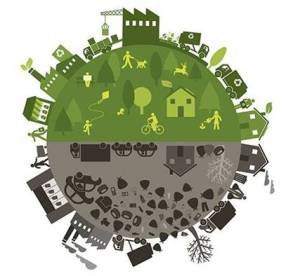 With renewable energy becoming more productive and less costly, with storage of electrons becoming something that doesn’t have to be dealt with via 12 Volt batteries, how we generate and distribute energy will likely be very different in the years ahead. Our municipalities plan our communities and while past municipal energy planning may have been as simple as “just hook up to the grid”, moving forward the realization that there are better, more cost effective ways to manage a community’s energy needs is gaining a lot more awareness. Why? Well because it makes a lot of sense. A lot of money is spent to meet energy needs and most of that money leaves the local economy. if there are ways to reduce energy needs or meet those needs more locally in a cost effective manner, why not? is a better question.
With renewable energy becoming more productive and less costly, with storage of electrons becoming something that doesn’t have to be dealt with via 12 Volt batteries, how we generate and distribute energy will likely be very different in the years ahead. Our municipalities plan our communities and while past municipal energy planning may have been as simple as “just hook up to the grid”, moving forward the realization that there are better, more cost effective ways to manage a community’s energy needs is gaining a lot more awareness. Why? Well because it makes a lot of sense. A lot of money is spent to meet energy needs and most of that money leaves the local economy. if there are ways to reduce energy needs or meet those needs more locally in a cost effective manner, why not? is a better question.
Community Energy Planning
- Improves energy efficiency
- Reduces air pollution and greenhouse gas emissions
- Fosters local sustainable energy solutions in the community
- Addresses energy limitations where they exist
- Reduces community vulnerability to energy price increases
- Increases energy security and resilience
- Builds a local energy efficiency and local energy market sector
- Retains energy dollars within the community
- Supports local economic development
In order to support increased capacity on the part of municipalities and their stakeholders to become more engaged in community energy planning, Clean Air Partnership, QUEST and Canadian Urban Institute facilitated a Ontario Energy Community of Practice. As part of the project, a number of training modules and resources were developed that speak to the benefits and application of community energy planning, how it fits with more regional energy planning, and lessons learned that better enable communities to move from planning and into implementation. Visit the Ontario ECOP page to learn more about the project and access the resources.









Leave a comment